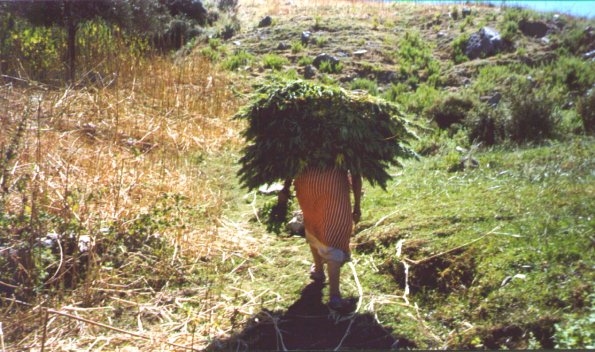This last august, I was returning from a road trip in Morocco. We had been driving from Barcelona to the north-african country and travelled along its gorgeous and unexplored Atlantic coast for a month. The last day of the trip, we woke up in Fès: we had some hours of driving in front before getting to Ceuta, where we would take a ferry back to the peninsula.
In the middle of the journey, we entered the province of Ketama, in the Riff’s mountains. The roads were curvy and steep, surrounded by fir trees and growing fields letting see from time to time beautiful landscapes. Suddenly, we realized that one the fields had actually marijuana plants in it. I had already heard of the big production of the Moroccan hash but I wasn’t expecting to see such a big plantation of cannabis, and so close to a transited road. And this was only the beginning. The following two hours, we kept driving next to hundreds of hemp fields. Sometimes, these budded plants extended as far as the eyes could see in the mountains. Next to the road, several men were offering smokes and visits to the ‘villas’ where the hash was produced. It was ironic to see police officers standing on checkpoints every few kilometres. The environment had a glimpse of gloom; in a village we stopped, the perception of poverty was more intense than the other regions we had visited and a sense of decadence could be felt on the people and the activity of the place.
All this was very surprising for me and I wondered why the government of Morocco didn’t take action on that although Marijuana is illegal in the country. Later on, I read that every year, thousands of tones of hash are being exported to the EU and the economic impact that this has on the country is big enough to not make the government stop the system. However, the wealth of the business is far from being equally divided; back in the 1970s, when the international trade started, middlemen made fortune with it and, up to nowadays, the paternalist structure has remained untouched.
In my opinion, it is a big nonsense that such corrupted and unfair system is maintained to cover the recreational wills of European citizens. But how can this be ended? Is legalization a solution? That is for sure a complex issue. From my point of view, I can see two possible paths: either the cannabis flux is totally restricted by the EU authorities or the trade – and consequently the drug – is legalized and brought to the light of the market.
